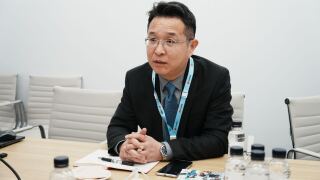|
The ITU is, without question, tackling some of the major topics dominating the telecoms industry today. Its activities focus on ensuring that broadband access is regarded as a basic infrastructure in modern society. With internet policy and governance high on its agenda, the activities of the ITU are shaping the face of the industry – and of the world around us – as we look on. But its efforts cannot, and must not, take place in an idealised isolation. When formulating policy which has such a fundamental impact both on telecoms businesses and the international economies within which they operate, the ITU is well aware that it must take into account the interests of the telecoms industry and the private sector practitioners within it.
Dr Hamadoun Touré has been secretary-general of the ITU since 2007, but before this had established a solid background in the private satellite industry, later working for Intelsat and ICO Global Communications. He is well aware of the importance of working hand in hand with business. "We have over 700 private companies working in the organisation," Touré explains. "I myself ran my candidature for secretary-general based on the fact that I came from the private sector. We believe in the power of the private sector here at the ITU. If there is the right regulatory environment, it can do the job."
A complementary arrangement
Many of Touré’s concerns are about formulating the right balance between the regulators and those tackling implementation, between governments and the private sector. He obviously appreciates the need to develop a complementary and functional relationship between the two parties, and is unashamedly pragmatic in his approach: "One party is to make the right policy, and the other party is to invest in that. Of course some will make profits in the process, but that’s fine. They will create jobs, they will give new services and applications, and the government will buy some of their services. This is how the business has been evolving – all driven by the private sector, but also driven by good regulation by governments as well."
Striking a good balance between regulators and the private sector has been a constant thread in Touré’s activities. When he set up the Broadband Commission for Digital Development in 2010, the two co-chairs he appointed reflected his need for balance: Paul Kagame, President of Rwanda; and Carlos Slim, honorary lifetime chairman of Grupo Carso. Other private sector commissioners include César Alierta, CEO of Telefonica; John Chambers, chairman and CEO of Cisco Systems; Sunil Bharti Mittal, chairman of bharti airtel; Dennis O’Brien, chairman of the Digicel Group; Sun Yafang, chairperson of Huawei Technologies; Ben Verwaayen, CEO of Alcatel-Lucent; and Dr Wang Jianzhou, chairman and CEO of China Mobile.
Established by Touré, the Commission believes that high-speed, high-capacity broadband connections to the internet are an essential element in modern society and that, like roads or water, they should be regarded as a basic infrastructure. Touré admits that he is fond of quoting the Tunis Commitment, made in 2005 after the World Summit on the Information Society, which states that people everywhere have the right to "create, access, utilise and share information and knowledge". To Touré, this does not go far enough. He believes that it is also a fundamental right to provide "a ubiquitous, affordable and secure network that will preserve the right to communicate for every citizen on this planet."
National broadband vision
Touré’s vision for the role which broadband infrastructure can and should play in the future is extensive, believing that these networks have a truly transformational power. "I believe that broadband needs to move to the top of every country’s national agenda, and our role is to promote this. In this 21st century, broadband networks must be considered basic national infrastructure, just like transport, energy or water networks." Touré is aware that some countries have made this leap, and cites Costa Rica, which has recently included access to broadband in their constitution as a basic human right, along with Estonia, France and Finland, while others are looking to follow suit. "At the Broadband Commission, we want to put a national broadband vision in every country. That’s why in October, we’re going have a Broadband Leadership Summit within ITU Telecom World."
This vision, believes Touré, ties in with the United Nations Development Programme, specifically goal number 8, which aims to ‘develop a global partnership for development’. But he feels that any such goals and requirements for ICT connectivity should not be overly restrictive. "We’re promoting the implementation of many types of ICT. We’re not advocating any particular industry – fibre, wireless and satellite technologies are all complementary, and they will all find their niche in a complementary manner. We’re encouraging licensing that is not tied to any particular type of technology."
When tackling the problems of providing adequate capacity to low-density or rural areas, Touré is also open to the potential problems. The developed world has pushed for individual access, but he believes community access could be viable, where such an approach is necessary. But he believes that making broadband available to more remote communities should be part of licensing conditions. "If you do this, carriers will not concentrate only on huge profit-making areas. They will have to find the most cost-effective technologies to reach low-density areas."
Vision for development
Touré is clearly open to developments: "In the future, networks will serve as a critical infrastructure supporting a huge range of functions and activities that have nothing to do with web browsing. I’m talking here about the internet of things, of machine-to-machine communications. That will eventually account for far and away the biggest volume of traffic in the networks." And he reinforces his point about the need for adequate provision of infrastructure:
"I choose deliberately to emphasise the infrastructure part. That’s the role of the ITU. We want to be sure that the right infrastructure is there at the right time."
Despite his great ambition for the development of broadband and global connectivity, Touré remains pragmatic about the need for businesses to function without undue influence or interference. "There are some countries that have way over excessive regulation. I do not believe in heavy-handed regulation, and would like to see the ICT sector reach a concensus on a framework. Too much regulation kills, just like too much taxation kills."
The ITU appears to be firm in its intent to promote a civil partnership between governments and private sectors, and between international objectives and delivery. With the potential for growth in connectivity and networks still so significant, all parties will doubtless watch with interest in order to monitor and, where they can, influence, the expectations and regulations placed upon them. Balancing Touré’s views that broadband networks are a basic human right, with his hope that private businesses will be able to participate proactively in their development and delivery, requires an uncommon degree of sensitivity, understanding and vision over the coming years. The ITU, and Touré himself, face a challenge which everyone in the telecoms industry will watch with a significant degree of personal interest.
International Telecommunication Union (ITU)
History: The ITU was founded in Paris in 1865 as the International Telegraph Union. It took its present name in 1934, and in 1947 became a specialised agency of the United Nations. The work of the ITU now covers the whole ICT sector, from digital broadcasting to the internet, and from mobile technologies to 3D TV.
Secretary-General: Dr Hamadoun Touré was elected Secretary-General in January 2007, and was re-elected for a second four-year term in October 2010.
Membership: The ITU has been based upon public-private partnership since its inception. It currently has a membership of 192 countries and over 700 private-sector entities and academic institutions.
Objectives: The ITU defines itself as the premier global forum through which parties work towards consensus on a wide range of issues affecting the future direction of the ICT industry. It is committed to connecting all of the world’s people, wherever they live and whatever their means, and aims to protect and support everyone’s fundamental right to communicate.
Location: The ITU is headquartered in Geneva, Switzerland, and has 12 regional and area offices around the world.




